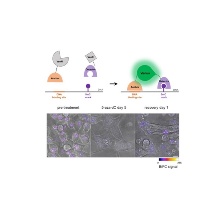Epigenetic modifications are important controls of the human genome, which determine in each cell whether and how strongly individual genes are read. Recently, we have developed a new method using bimolecular anchor / detector (BiAD) sensors to detect epigenetic states in living sites site-specifically in the genome. As part of the epigenetics program of the BW Foundation, a new cooperation project "Analysis of the dynamic changes of the epigenome during epithelial-to-mesenchymal transition in live cells using BiAD sensors" of Prof. Albert Jeltsch and Prof. Monilola Olayioye from the Institute Cell Biology and Immunology of the University of Stuttgart will be supported for 3 years starting in November. In this interdisciplinary project, we intend to further develop this technology and investigate epigenetic changes in target genes during cellular differentiation and epithelial to mesenchymal transition (EMT) in mammary epithelial cells.


